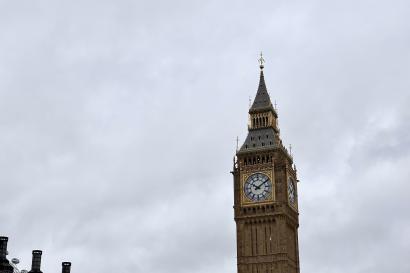This past weekend we had the incredible opportunity to travel to the French island of Corsica with IES Abroad! It’s not often that one gets to go somewhere with a group of fellow students that’s both aesthetically beautiful and historically fascinating.
To begin with, Corsica has gorgeous geography. The drive from Ajaccio (the airport) to Bonifacio was breathtaking, intermittently dotted by green forests, rocky terrains, and glimpses of the blue waters. I’ve been on some beautiful drives before (the six hours through Western Kansas definitely not being one of them) and this one makes a top five. The surprising lushness was a nice change from the views of Western European cities’ architecture I’m used to seeing on my weekend excursions.
My favorite part of the trip may have been visiting the Ile des Sanguinaires, in which we had the opportunity to hike to the top of a hill and overlook the Mediterranean waves crashing on the rocky shores of this short string of islands right off the main coast. I’m going to stop my description here because no words do justice to the beautiful landscape (and honestly, the pictures I took don’t do justice either, but I’ve posted some on here anyway). Even though this happens every time, I am always surprised by the overwhelming sense of peace I feel being surrounded by such natural beauty. The undeveloped and pastoral scenery of Corsica coupled with the rural lifestyle of the people exude an overall sense of placidity, in contrast with the glamorous sentiment that most people connote with the rest of France. In this way, Corsica was very rejuvenating for me.
Now for a quick history lesson. Corsica is the birthplace of Napoleon Bonaparte, who, if you don’t know, was the emperor of France from 1804-1815. We got to visit the home-turned-museum where Napoleon was born and learn about how a political vacuum after the French Revolution left a position of power ripe for the taking. Napoleon, as a military general, was one of the few successful players in French politics during this time, having gained favor from the public for his effective military campaigns. Although Napoleon’s reckless quest for power and French domination in Europe led to his demise, as well as the tragic deaths of thousands of French soldiers, he left a lasting impact on France by modernizing it. He developed the Napoleonic Code of Law, which is still used all over the world today, updated the French university system, and formed regulations for banking and commerce that are also still in place.
One of the most fascinating things that the IES Abroad history professor talked about was how Napoleon embodied this mounting sense of Franch nationalism. After a period of political turmoil in which citizens were left craving identity and stabilization, Napoleon championed the idea of nationalism. This not only unified the French, but gave them a feeling of security and pride for their culture. Napoleon’s attempt to impose this French dominance on other countries led other nations to unify within themselves and experience this same feeling of pride for their culture and a determinacy to see it thrive and, consequentially, oppose Napoleon’s power.
Ironically, we see this same phenomenon taking place in society today, where cultures tend to swing from desiring a strong figure in power who offers protection and preservation of the nation to focusing on the individual and recognizing civil liberties for all people. Not surprisingly, Trump, in a sense, embodies a lot of the same principles that Napoleon did and I think it’s fascinating to see how history is repeating itself in America and Western European countries today
So, I know that I’m a history nerd, and that some of you may have stopped reading once I stopped talking about the scenery, but I think it’s imperative to understand how the past is reoccurring in the present. Napoleon saw the future as French, and thus sought to both preserve and promote its ideals across the world. While this left strengthened French culture, it destroyed a lot of people in its wake and so we must be careful that something like this doesn’t happen again.

Rosemary Newsome
My name is Rosemary Newsome, and I am studying abroad in Nice, France! I study finance and political science at TCU. For me, there is always something new out there to learn, make, do or play, and studying abroad in Nice offers a whole new arena in which I can do that. If you want to learn about the triumphs & trials of a bright-eyed, goofy, restless, and French cuisine-loving girl, follow me as I immerse myself in the culture of a Riviera lifestyle!










